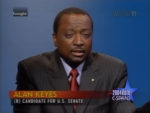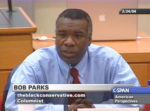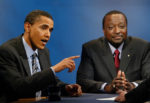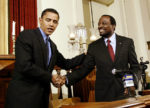 Now I can imagine what emotions may have been running through your head when you read that sarcastic title. I’m quite sure they were similar to those I felt when I was told Illinois U.S. Senate candidate Alan Keyes basically flopped on his long-standing position against slave reparations.
Now I can imagine what emotions may have been running through your head when you read that sarcastic title. I’m quite sure they were similar to those I felt when I was told Illinois U.S. Senate candidate Alan Keyes basically flopped on his long-standing position against slave reparations.
When a person decides to enter the arena of ideas, I would ask him or her to make a simple decision: either be a pundit or a politician. When one is a pundit and tries to influence the sentiments of others, all he or she has is their word. Politicians have no such impediment. Their primary goal is to be elected by as many people as possible, so past loyalties can and will be sacrificed to meet that objective.
I feel like I’ve been Keyed….
At the risk of alienating myself from the good people who support him, it’s now time I stick by my convictions and cut Alan Keyes and this new baggage loose.
 I nervously talked with him briefly in 1996 on the phone when I was making a pitch to produce the radio and television advertisements for his presidential campaign. I had a more lengthy conversation with his chief-of-staff, but later I had to look the other way when he acted the fool trying to crash a televised presidential debate in Atlanta and got arrested. That campaign bid failed, but I remained a loyal fan of his.
I nervously talked with him briefly in 1996 on the phone when I was making a pitch to produce the radio and television advertisements for his presidential campaign. I had a more lengthy conversation with his chief-of-staff, but later I had to look the other way when he acted the fool trying to crash a televised presidential debate in Atlanta and got arrested. That campaign bid failed, but I remained a loyal fan of his.
I watched in awe as he delivered incredibly moving speeches during the Clinton impeachment rallies in Washington, D.C. I saw him make women cry as he put words together in ways that could only be described as genius, and he was ad-libbing…!
It was that Alan Keyes that gave me the fire in the belly to become active in politics and later a columnist. I knew, as such, I’d have to carefully choose my positions and be ready to stand by them no matter what. To do otherwise risks credibility, which is all a columnist has.
 I went to Stanford Law College last February and despite the snickering from some students who hide within the safety of group-think, I defended my thesis against reparations. I wrote a column saying so two years ago and have remained consistent whenever the topic came back into the news. Should I flip on that position, I’ll have to not only explain myself to those who will feel betrayed, but those who didn’t like me in the first place who’ll throw that column right back in my face.
I went to Stanford Law College last February and despite the snickering from some students who hide within the safety of group-think, I defended my thesis against reparations. I wrote a column saying so two years ago and have remained consistent whenever the topic came back into the news. Should I flip on that position, I’ll have to not only explain myself to those who will feel betrayed, but those who didn’t like me in the first place who’ll throw that column right back in my face.
In April 2002, Alan Keyes wrote an anti-reparations column called “Paid in Blood” in which he said:
“Holy Week is a season for reflecting on a great price paid, once and for all, and the life that arose in triumph over sin and evil once that price was paid. And what an unfortunate season, indeed, for some to renew their effort to extort ‘reparations’ for slavery from their fellow citizens.
“Yet, lawsuits have been filed. Those responsible propose to settle the accounts of slavery leaving the Civil War out of the equation – complete and utter nonsense. The price for the sin of slavery has already been paid, in blood.”
Thousands of white people died in an effort to free blacks from the legal industry of slavery. Since then, yes, the road has been rocky, but if the legacy of slavery were still ingrained in society, there would be no Oprah Winfrey or Bill Cosby or Michael Jordan, or me. They only thing separating their stature from mine is that they got seriously paid.
But Keyes adequately made the point; “The price for the sin of slavery has already been paid, in blood.”
Keyes quoted President Abraham Lincoln:
If we shall suppose that American Slavery is one of those offences which, in the providence of God, must needs come, but which He now wills to remove, and that He gives to both North and South, this terrible war, as the woe due to those by whom the offence came until all the wealth piled by the bond-man’s 250 years of unrequited toil shall be sunk, and until every drop of blood drawn with the lash, shall be paid by another drawn with the sword, as was said 3,000 years ago, so still it must be said, “the judgments of the Lord, are true and righteous altogether.”
 Before we get too far off course, since we know where Keyes was coming from before, let’s compare that to what he said on August 17, 2004, when in an attempt to suck up to liberals and blacks in Illinois, he suggested that a “tax amnesty” be granted to help black people and called it a “traditionally Republican, conservative and market-oriented approach.”
Before we get too far off course, since we know where Keyes was coming from before, let’s compare that to what he said on August 17, 2004, when in an attempt to suck up to liberals and blacks in Illinois, he suggested that a “tax amnesty” be granted to help black people and called it a “traditionally Republican, conservative and market-oriented approach.”
When asked by a Chicago Tribune reporter who quoted Keyes on his television show when he said, “You want to tell me that what they suffered can actually be repaired with money? You’re going to do the same thing those slaveholders did, put a money price on something that can’t possibly be quantified in that way.” Keyes replied our nation has tried many ways with “the Great Society programs of the sixties” to “the original and proper concept of affirmative action developed under Republican leadership during the Nixon years” and he questions its success.
He added idea of “removing the tax burden from the black community for a generation or two in order to encourage business ownership, create jobs and support the development of strong economic foundations for working families. This has the advantage of letting people help themselves, rather then pouring money into government bureaucracies that displace and discourage their own efforts.”
I would’ve liked to see Alan Keyes state his objection of reparations to the quick-pick-lotto-mentality electorate. I would’ve liked to see if he could have single-handedly turned around that issue and left the Randall Robinson wing neutered. That would be one hell of a legacy. But Alan Keyes became just one more in a group of hacks that will say and do anything to get elected and it is therefore a sad day.
Keyes’ objected to reparations before because it would take money directly from citizens who were not directly involved in the slave trade. He now claims a ‘tax-exemption’ reparation would correct “the historic imbalance that results from the truth that black slaves toiled for generations at a tax rate that was effectively 100 percent.”
He concluded by saying, “My firm goal and ultimate objective is to replace the income tax, and thereby free all Americans from this insidious form of tax slavery. It is well known that this is one of the key priorities of the Keyes campaign.”
I acknowledge I walk on shaky ground when going up against Alan Keyes rhetorically, but this is no place for his spin. In reality, another word for spin is “bullshit.”
Alan Keyes was one of those people who instructed us to stand up for our convictions and be ready to defend them no matter what. When a professor at Stanford called me and fellow black conservatives “misguided” in front of a national television audience, I didn’t retreat. I didn’t qualify. I didn’t tone it down. I didn’t forget what I wrote before in order to-go-along-to-get-along.
I stood my ground and denounced a scheme that would make certain “scholars” and lawyers rich beyond their dreams, and make black people better off temporarily. As I said there and wrote before, once the money’s gone, what’s next? How many times can blacks go back to the well and seek more water? And if you think race relations fluctuate now, just wait until every non-black in this country has to dig deep to right a wrong that happened close to two centuries ago.
In 2002 Keyes wrote, “Our liberty, reborn from the Civil War’s labor, remains imperfect – as we must expect of any mortal thing. Pettifogging lawyers and dishonest scholars will always be able to carp selectively and ignorantly about the warts upon our body politic.
“But the truth of the Civil War is that the terrible price for American slavery has been paid, once for all, by the American people’s deliberate acceptance of their duty to pay it when, in God’s providence, Southern intransigence brought it due.”
So what happened to Alan Keyes? What happened to those “convictions?”
Last May 14th, I went to Faneuil Hall in Boston to record Keyes on the eve of the Gay Marriage law being enacted in Massachusetts. After his speech, I approached his agent and asked if the congressional candidate I was representing could meet Alan. I was asked point blank, “Is he pro-life?” After answering in the affirmative, I realized that this was a qualifier. Keyes seemingly didn’t want to share the same air as someone who didn’t share his convictions.
 So how now can Keyes look people in the eye who’ve stuck by him amidst four failed candidacies and television show and expect us to look the other way on this, especially when we dare not cross him when it comes to betraying his “convictions?”
So how now can Keyes look people in the eye who’ve stuck by him amidst four failed candidacies and television show and expect us to look the other way on this, especially when we dare not cross him when it comes to betraying his “convictions?”
Every black conservative needs to take a time out and slowly remove the knife Alan Keyes has firmly planted in each of our backs. When I go to colleges this fall and try to articulate a different point of view on politics, I’ll have to be prepared when Alan Keyes’ words are thrown in my face. Since Keyes now calls for some kind of payback, my opinion will certainly be taken as a joke when compared to someone of his former stature.
For that reason I will have to distance myself from Alan Keyes for the time being. After writing this, I know I’ll be persona non grata with the Keyes folks, but I do this because that’s what standing on one’s principles means, and I refuse to be spun. What he’s doing is essentially talking down to an audience he must feel is gullible and beneath him. That goes against everything I believe as a black Republican.
I’m sure if he loses in November he may take it all back, since after being rejected by the citizens of Illinois, all he’ll have is what is left of his loyal Republican base.
I understand that politics makes people say and do things they feel uncomfortable with, but I never thought that would apply to “Mr. Convictions” himself.
I never dreamed I would ever be in disagreement with Alan Keyes out of fear he’d lecture me into tears. But this time he’s wrong and he’s damaged a lot of people who’ve been standing by him in this battle of ideas. I may not ever be able to talk with him on the phone again, but so be it.
That is called “conviction.”


Leave a Reply